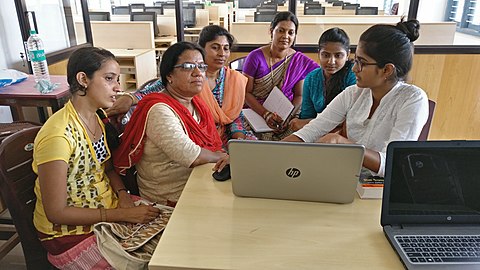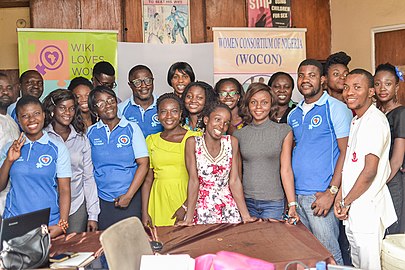Gender equity report 2018/Best practices

We asked the interviewees to describe one or two strategies that make their gender equity work most successful.[1] Here are the top six practices they named:
- Host off-wiki events
- Focus on content creation
- Focus on intersectional knowledge
- Track progress (number of articles created, number of editors)
- Recruit new participants
- Cultivate partnerships
Interviewees elaborated in their comments about each of these practices, as follows.
Host off-wiki events[edit]
- "Providing physical space--where people can discuss their issues, ask for help, learn together, instead of bumping into things alone while writing in their houses--is one of the elements of successful experiences. It increases the collective nature, belonging to a community. That is pretty powerful. We may have stumbled into it. Learning together [makes us] very strong. Maybe in 2-3 yrs, we’ll have very strong editors. Whereas alone in your house, it will take so long to learn by yourself, e.g. templates. I can hope that in 5 yrs there will be some admins coming out of it. I am thinking ahead of myself but it’s like throwing seeds. It could change culture."
- "Off-line events are encouraging for people. They feel they make a difference in the movement. They want to see you again. Before we started the UN campaign we had--1 month earlier--we had a big social media campaign to raise awareness of what we were doing. So it made people proud to participate. It was psychological. It had a big impact on people."
- "We are organizing quite a lot of meetups, national meetups. Women like to meet in person to feel that this is a friendly place, to feel that they are a part of the community, they don’t feel shy about what they can’t do. Every time we see more women attending these meetups."
Focus on content creation[edit]
- “What has been very successful for us is choosing [content] themes. Many of these women whom we’re creating lists for, it was a great motivation to research these women, e.g. scientists, everyone was very interested in learning about women scientists in India. Learning about different women, and creating the content, motivates them. They prefer to create an article, rather than improving others.”
Focus on intersectional knowledge[edit]

Many interviewees talked about the critical importance of an intersectional lens in achieving knowledge equity, working in solidarity with all marginalized groups rather than focusing exclusively on gender equity. Several interviewees described projects co-led through intersectional partnerships with, for example, Dalit women (India; diaspora), queer activists in Bosnia & Herzegovina and the Kumeyaay Nation in southern California and Baja California.
- One participant emphasized the value of "Centering marginalized communities and intersectional knowledge; reaching out and having conversations with marginalized communities themselves; having strong community organizers in those communities who can bring in more participants and scholars from their own communities; working with communities to think about sources that really represented the knowledge of those communities."
- "Think of diversity as intersectional. Gender itself is multi-layered. As a feminist myself, it is not primarily about how I identify--as male or female or non-binary. I think about how it transects other identifies. We come at plurality in different ways, gender being a core focus. Gender is an entry point, not an exit point. All of us are living in body identities of different kinds. Gender is one; but it is not the only one."
This learning pattern on Centering Marginalized Knowledge, created by Whose Knowledge?, offers a deeper exploration of how to take an intersectional approach to knowledge equity.
Track progress[edit]
- "They have started to track gender participation in all programs that they do (education, GLAM, connected heritage, wikidata, technical development, community support -- not just outreach programs). Enables them to understand what they do, where they put their resources, who’s invited, who feels invited. Tracking can give data about what do and what can be done differently."
Recruit new participants[edit]
- "Outreach from outside--for example ask the press to join you in a workshop. [New volunteers bring] a different set of eyes, bring in their own network/contacts."
- "Being successful in developing a safe space for different groups which don’t generally feel safe on the internet."
Cultivate partnerships[edit]
Cultivation of partnerships was one of the most widely described strategies across all interviewees. Because of its special importance, this strategy is described in greater detail in a separate page here: Partnerships


Because marginalized groups face discrimination within the larger culture, many find it useful to create safe spaces in which only members identified with the group may participate. These safe spaces allow members to collaboratively learn and edit together in a supportive environment, with relative freedom from negative bias.
The use of safe spaces is widely embraced by the interviewees included in this report. Fully 80% of them said their projects are only open to people with gender identities that are marginalized on Wikimedia projects:
- 50% percent of interviewees indicated that they work with women-only groups.
- Some interviewees said all women, transgendered and cisgendered, are proactively welcomed at women-only events.
- Some interviewees described cultural contexts in which cisgendered identity is implicitly assumed in women-only groups. One interviewee said their language lacks vocabulary to even describe non-binary gender: "In our country, we only talk about male or female, but not those who are fluid or who do not conform. We don’t talk about anything beyond that.”
- 30% percent of interviewees described events that include not just women, but any queer, gender-non-conforming and gender-non-binary people.
- The final 20% of interviewees work with all genders, including allied cisgendered heterosexual men as participants in their events.
Some interviewees talked about how their capacity to experience and practice inclusion has expanded through their work on wiki, especially in regard to transgender people:
- “I have often commented that I didn’t really understand the entire concept of transgender till I started working with Wikimedians... I’ve learned a lot from working with people who identify in different way than I do. And it’s helped me outside of wiki, too.”
- "I mentioned before that I met more trans people through wiki than otherwise and they focus on lots of different articles. They can be themselves without putting on a mask."
Many interviewees share a broadly inclusive value for centering the knowledge of people who are systemically marginalized, whether because of their gender, race, class, caste, sexual orientation or any other aspect of their identity. The section of this report about intersectional knowledge, above, has further discussion about intersectional inclusion practices.
We asked interviewees about their preferred communication strategies for gender diversity projects. A significant majority, 80% of interviewees, said they prefer off-wiki communication methods like email, Facebook, Whatsapp, Snapchat and IRC. Only 2% communicate on-wiki (with an additional 17% using both onwiki and offwiki channels and 1 % who don't communicate with others at all in their gender equity work). The overwhelming practice of communicating and organizing off-wiki raises questions of both how to best support off-wiki engagement, but also about the barriers to and potential solutions for making on-wiki channels safer spaces for gender equity advancement.
- ↑ We note that, historically, the Wikimedia movement defined success in terms of increased content and number of editors. Though we did not intend this definition of success for this interview, many interviewees' responses suggest that historical precedent influenced how they interpreted this question.









